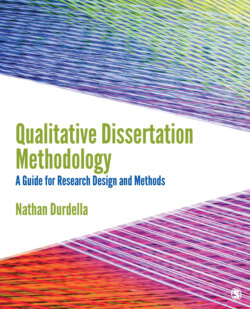Читать книгу Qualitative Dissertation Methodology - Nathan Durdella - Страница 77
На сайте Литреса книга снята с продажи.
Qualitative dissertation methodology as an approach to inquiry.
ОглавлениеWhatever the factors that explain the specific features of a student’s methodological framework for her or his dissertation work, he or she uses a distinct format and unique structure to articulate the steps in site selection, participant selection and recruitment, instrumentation, data collection and analysis procedures, and interpretation. What is so unique about dissertation methodology? What distinguishes dissertation methodology from approaches that appear in other scholarly works—including research articles in peer-reviewed journals—is the level of operational specificity and amount of procedural detail. Indeed, dissertations require an explicit, transparent format that lays out the steps that student researchers follow in implementing their research purposes and evaluating their research questions. This is a roadmap of sorts—a way to move from little to no information to interpreted patterns of information about a topic.
Why so many procedural details and such operational specificity? The function of dissertations in doctoral education—primarily as instructional tools and mechanisms to certify new members of the academy—and the dissertation proposal, where the methodology section appears, is in part a contract between a student and dissertation committee. Accordingly, the contract terms spell out what you will do—and the methodology section “is usually the most carefully read section of the whole proposal” (Krathwohl & Smith, 2005, p. 75). And just as many contracts are written, so is the dissertation proposal and final dissertation—documenting student efforts to design an original investigation and present new knowledge. Methodologically speaking, the contract terms must include the answers to the following questions:
1 What is important to you—what you value—in investigations of human social life (design or tradition),
2 where will you go to gather information (research setting),
3 with whom will you talk with (research sample),
4 with what and how will you talk with them (data collection instruments and procedures),
5 how will you understand and interpret what they share (data analysis procedures), and
6 how will you describe your role in the study and account for your effects on whom you talk with and how you interpret what they share (researcher roles)?
This final section on research roles is extremely important in qualitative research contexts—but it is sometimes omitted from dissertation studies and studies that appear in published research journals. You can find reflexive research practices and applications of researcher roles in dissertation methodology in Chapter 8—so more later on this issue!
Given the general structure and content of the methodology section and expectations related to what students include in the presentation of design and methods, I argue that we can discuss dissertation methodology as a methodology or an approach to inquiry. More to the point: We can talk about qualitative dissertation methodology as a specific research approach. That is, we can identify and describe a unique set of assumptions and guiding principles associated with traditional qualitative methodologies like ethnography, phenomenology, grounded theory, and so on and frame this approach as a methodology unique to dissertations—and qualitative dissertations in particular. This is not to say or imply that qualitative dissertation methodology imitates, replaces, or qualifies as traditional methodologies in dissertations. By no means! Rather, the use of these traditional methodologies in dissertation contexts allows student researchers to enhance procedural detail and further specify operational steps in their research work and extend dimensional practices of qualitative research that are generally implicit in published research studies: detailing procedural steps, protecting human subjects, articulating researcher roles, and developing reflexive strategies.
